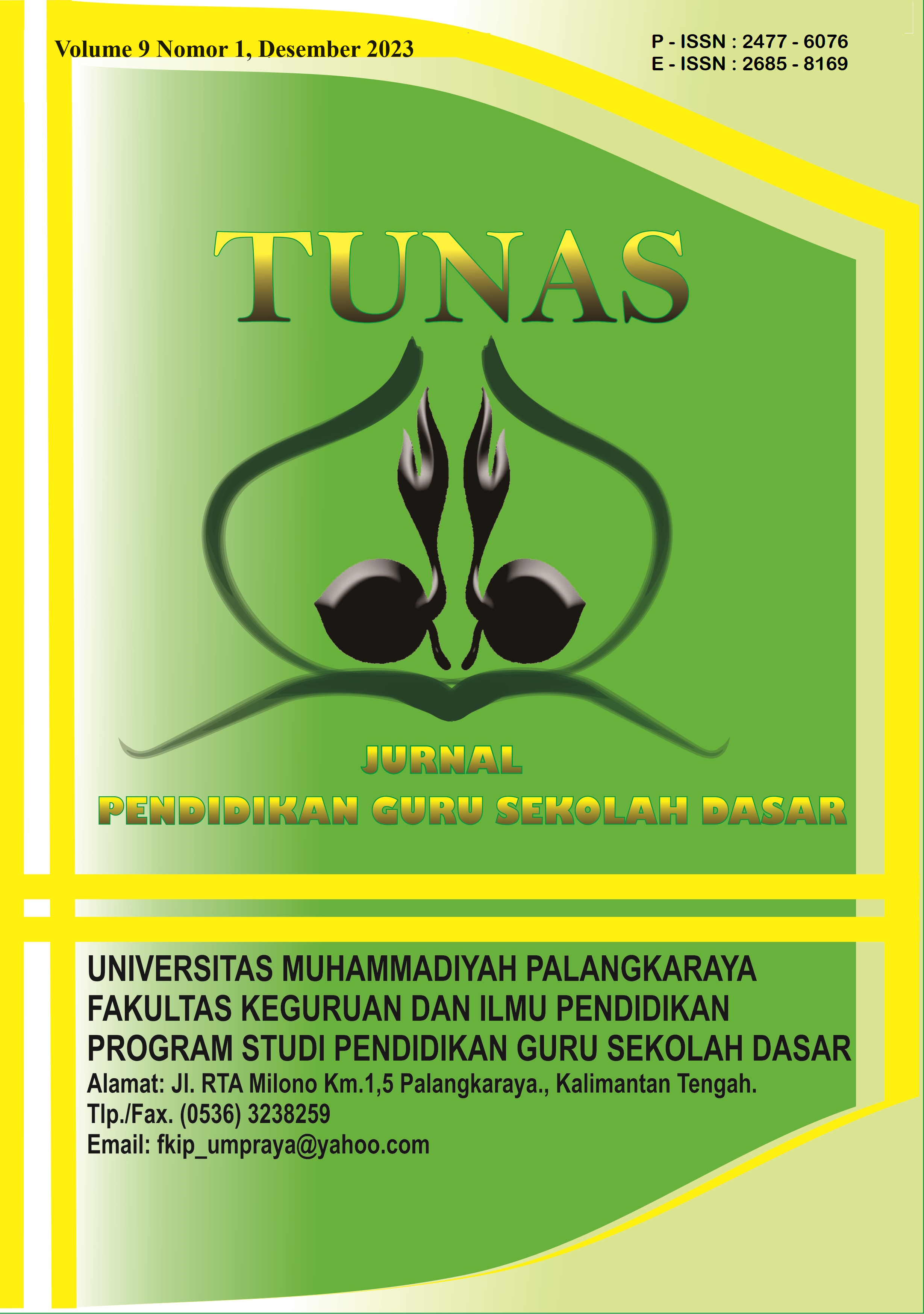Improving Student Learning Outcomes Through The Implementation of Storytelling Cooperative Learning Models
Main Article Content
Abstract
Educational philosophy subject is one of mandatory subject that should be taken by student in the first semester of Primary Teacher Education Program in University of Muhammadiyah Palangkaraya. In fact, many students complained about difficulties in understanding the content of this subject. Cooperative learning by using storytelling method is one of the methodologies that can be used in teaching learning process. There are no previous research results that examine the cooperative learning model using the storytelling method, so researchers are interested in researching the implementation of the cooperative learning model using the storytelling method in improving student learning outcomes. This research uses the Classroom Action Research (CAR) method which focuses on efforts to improve student learning outcomes in educational philosophy subject. This research consist of 2 cycles, In cycle 1 students have not been able to reach the criteria for completion that has been determined. The class average score is 70, with learning completion was 62% or as many as 26 students from total 42 students. Therefore, cycle II has to be taken by the researcher, and as the result of cycle II the students has achieved the criteria for completion that were previously determined, with average score obtained was 85, 85% of students completed their studies (36 students from total 42 students).
Downloads
Article Details

This work is licensed under a Creative Commons Attribution-ShareAlike 4.0 International License.
Authors who publish with this journal agree to the following terms:
- Any article on the copyright is retained by the author(s).
- The author grants the journal, right of first publication with the work simultaneously licensed under a Creative Commons Attribution License that allows others to share work with an acknowledgment of the work authors and initial publications in this journal.
- Authors are able to enter into separate, additional contractual arrangements for the non-exclusive distribution of published articles of work (eg, post-institutional repository) or publish it in a book, with acknowledgment of its initial publication in this journal.
- Authors are permitted and encouraged to post their work online (e.g., in institutional repositories or on their websites) prior to and during the submission process, as can lead to productive exchanges, as well as earlier and greater citation of published work.
- The article and any associated published material is distributed under the Creative Commons Attribution-ShareAlike 4.0 International License
References
Ahyar, D.B., et.ell (2021). Model-model Pembelajaran. Pradina Pustaka Sukoharjo. https://www.google.co.id/books/edition/Model_Model_Pembelajaran/OshEEAAAQBAJ?hl=en&gbpv=1
Asiyah, O. M., & Jazuli, M. F. (2022). Meningkatkan Motivasi Belajar Sebagai Solusi Terhadap Problem Malas Kuliah. Arus Jurnal Pendidikan, 2(1), 16–20. https://doi.org/10.57250/ajup.v2i1.49
Faz, G. O., & Hafid, I. (2023). Guru Pembimbing Khusus (GPK) di Sekolah Inklusi Palangka Raya: Shadow Teacher of Inclusive School in Palangka Raya. Tunas: Jurnal Pendidikan Guru Sekolah Dasar, 8(2), 47–54. https://doi.org/10.33084/tunas.v8i2.5148
Ferdiansyah, S. (2019). Pendekatan Pedagogis Membuat Digital Storytelling: Panduan Praktis untuk Guru dan Calon Guru: A Pedagogical Approach in Digital Storytelling Making: A Practical Guide for Teachers and Pre-Service Teachers. MEJATAMU.
Junaedi, A., & Sjafrizal, T. (2020). KOMUNIKASI DOSEN DENGAN MAHASISWA DALAM KEGIATAN PEMBELAJARAN MELALUI METODE CERAMAH. 01.
Pambudi, G., Andriana, E. ., & Dewi, R. S. (2023). Kajian Etnopedagogi: Ubrug Banten Sebagai Sumber Belajar Siswa Sekolah Dasar: Ethnopedagogical Study: Ubrug Banten as a Learning Resource for Elementary School Students. Tunas: Jurnal Pendidikan Guru Sekolah Dasar, 8(2), 1–8. https://doi.org/10.33084/tunas.v8i2.3526
Putri, R. K. (2021). Hubungan Sikap Malas dan Prograstinasi Akademik pada Mahasiswa [Preprint]. PsyArXiv. https://doi.org/10.31234/osf.io/s7rqv
Sulistio, A., & Haryanti, D. N. (n.d.). MODEL PEMBELAJARAN KOOPERATIF (COOPERATIVE LEARNING MODEL).
susilo, H., Chotimah, H., & Sari, Y. D. (2022). Penelitian Tindakan Kelas. Media Nusa Creative (MNC Publishing).
ohana, F. M., Pratiwi, H. A., & Susanti, K. (2019). Penerapan Metode Role Play Storytelling dengan Menggunakan Media Poster pada Kemampuan Berbahasa Inggris Mahasiswa Desain Komunikasi Visual. 3(01).
Yuliana, D., & Putri, O. A. W. (2021). Pengaruh Penggunaan Digital Storytelling Terhadap Hasil Belajar Siswa Mata Pelajaran Dasar Desain Grafis. Jurnal Informatika Dan Teknologi Pendidikan, 1(1), Article 1. https://doi.org/10.25008/jitp.v1i1.7
